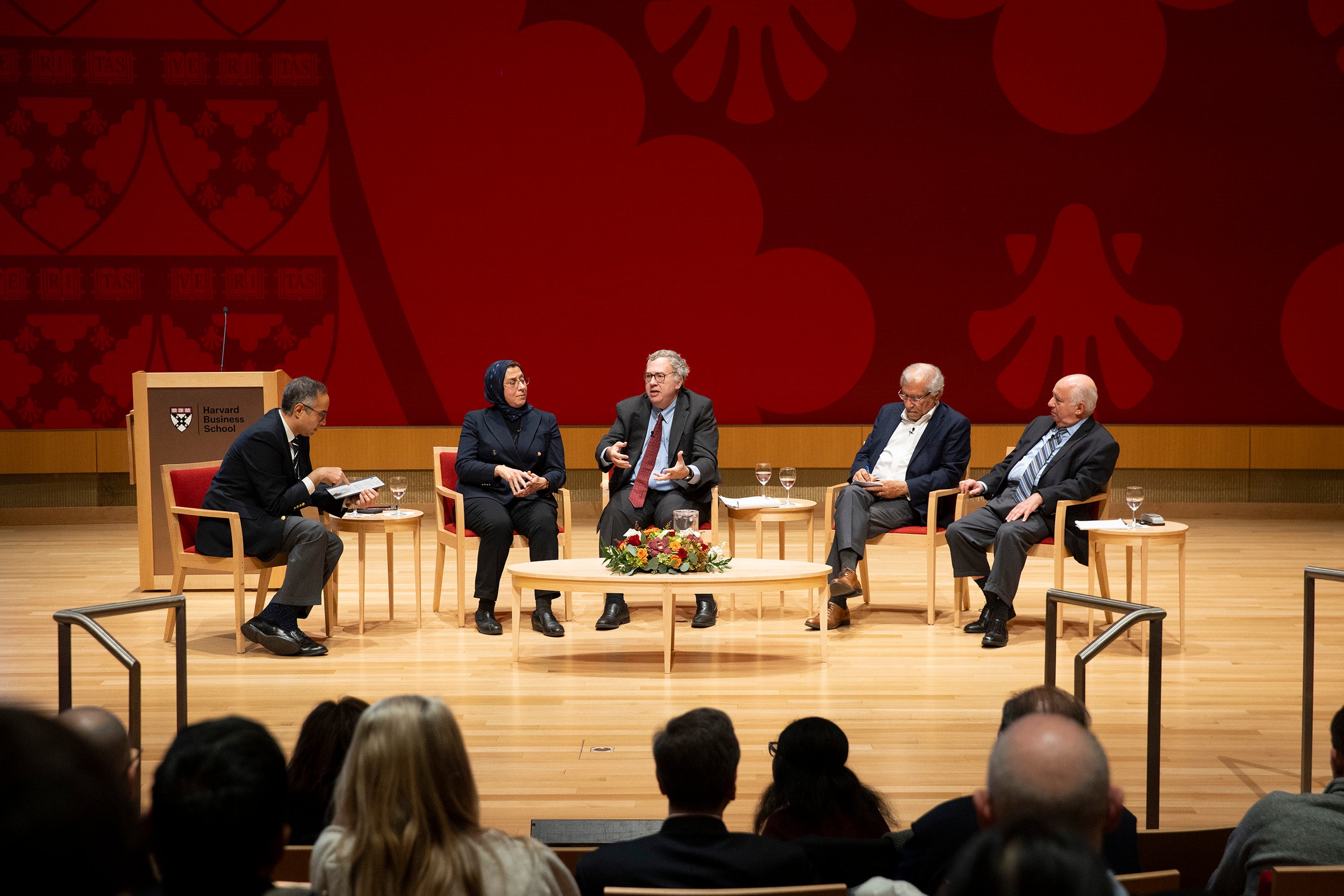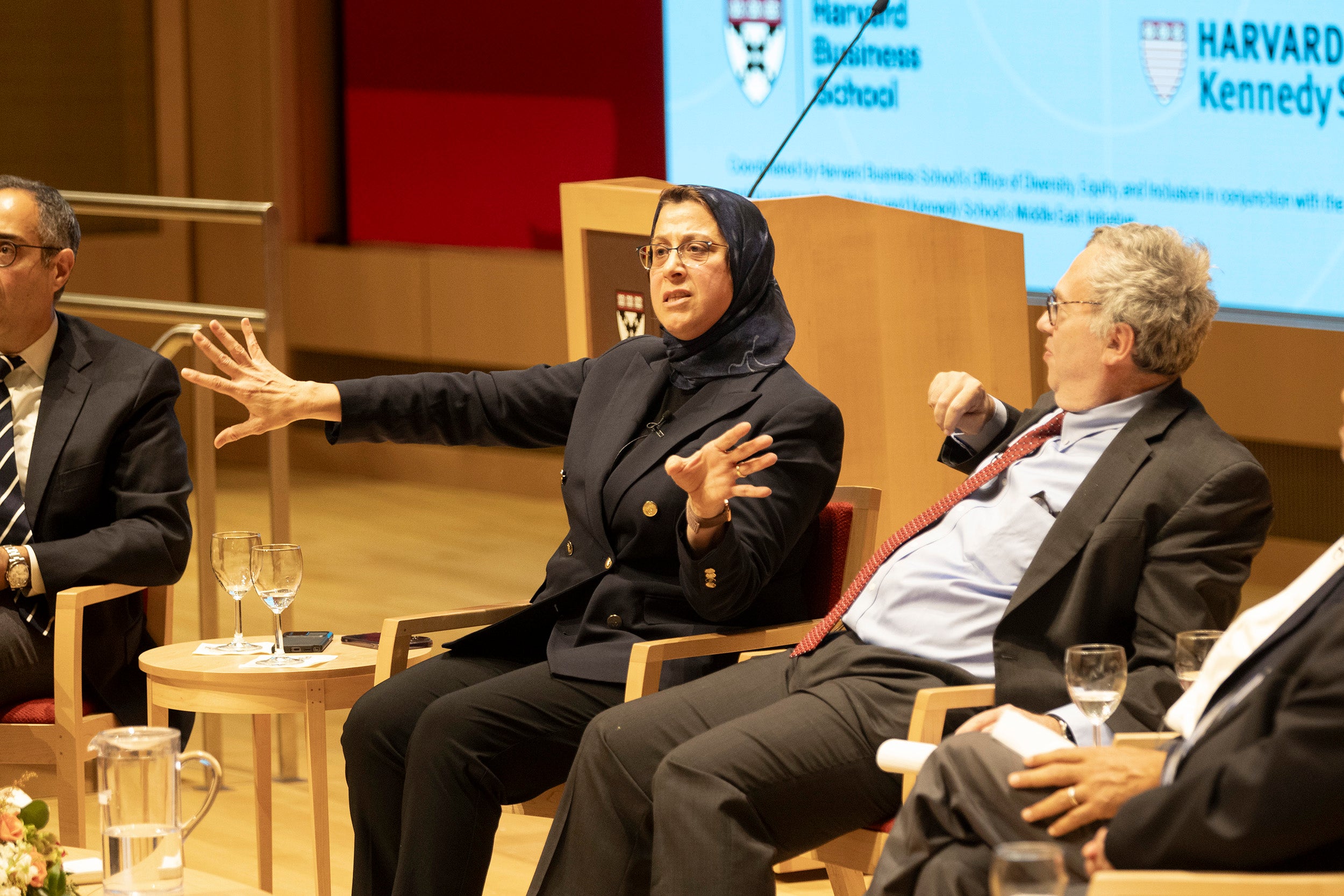
Panelists Tarek Masoud (from left), Amaney Jamal, David Makovsky, Khalil Shikaki, and Shai Feldman at Klarman Hall.
Photos by Niles Singer/Harvard Staff Photographer
Hope for progress survives terror and war
Can the Israelis and Palestinians find peace? Scholars discuss — and debate — long history of conflict, prospects for a durable accord
Scholars revisited the long history of Israel-Palestine conflict leading up to the Oct. 7 terror attack by Hamas and weighed potential steps toward peace before hundreds of Harvard community members at a recent Klarman Hall event.
“We’re here because of dead civilians, Jewish and Arab,” said moderator Tarek Masoud, faculty chair of the Middle East Initiative and Ford Foundation Professor of Democracy and Governance at Harvard Kennedy School, which co-hosted the Nov. 20 discussion with Harvard Business School.
The third such gathering convened by the Middle East Initiative in recent weeks, the event, which unfolded as Israel and Hamas negotiated a cease fire and hostage deal, was an attempt to share scholarly expertise with students so they can make better sense of the crisis and perhaps contribute to a solution, Masoud said. Srikant Datar, dean of the Business School, urged attendees to approach the talk “with open-mindedness and a commitment to empathy and learning.”

It’s important to separate the terror unleashed by Hamas from the plight of Palestinians in Gaza, said David Makovsky, a fellow at the Washington Institute for Near East Policy who served as senior adviser to the State Department’s Special Envoy for Israeli-Palestinian Negotiations from 2013 to 2014.
“This was a deliberate decision by the Hamas leadership to do [these] atrocities,” he said. “The people of Gaza did not commit these atrocities.”
Hamas chose to attack at a moment when its leadership believed Israel had been weakened by internal strife over the overhaul of Israel’s judiciary by Prime Minister Benjamin Netanyahu, according to Makovsky. Another key factor was the worry that a normalization pact between Saudi Arabia and Israel would be “game over” for the terror group, leaving Hamas isolated from the other Arab nations that had struck accords with Israel.
Panelists agreed that Hamas members are terrorists, not freedom fighters. They also agreed that Netanyahu has used Hamas in the past to help thwart peace efforts.
“The current Israeli government, led by Netanyahu, is the same government that has been trying for most of the last 16 years to create conditions, or to support conditions, that have essentially prevented any progress in that direction,” said Khalil Shikaki, director of the Palestinian Center for Policy and Survey Research in Ramallah. “Hamas was very instrumental in providing that kind of environment.”
At times, Masoud politely refereed passionate disagreements among the scholars over who did what during the decades that precipitated this crisis, further underscoring the enormous challenge facing those who wish to engage in reasoned debate on the subject.
On what the way forward looks like, the panelists were uncertain.
For Netanyahu, success in the short term would be to eliminate Hamas’ fighting and governing capacity and to free the hostages held in Gaza, said Shai Feldman, a professor of Israeli politics and society at Brandeis University. But eventually, the Israeli people will force a “major reckoning” internally about the policies and strategies the prime minister and his allies adopted.
Asked what role the international community can play to facilitate peace, Feldman said that if Hamas is defeated, perhaps a regional coalition made up Egypt, Jordan, and/or Saudi Arabia could temporarily take control in Gaza and make an effort to rejuvenate the Palestinian Authority, which was pursuing a two-state solution with Israel before Hamas rose to power in 2006.
“If violence were going to solve this conflict, it would have already,” said Amaney Jamal, dean of the Princeton School of Public and International Affairs and a daughter of Palestinian immigrants. “I would rather see our policies and efforts and the Palestinian Authority … make the message of peace and reconciliation far more attractive than any other message.”
She added: “This starts with people seeing tangible changes on the ground, but also political leaders to step up and sanction their leaders when they’re espousing violence and vitriol and hatred and the dehumanization of the other. We have been victims of this conflict since we were born. We would love to turn the page and be able to live with peace and dignity as Israelis, as Palestinians.”




